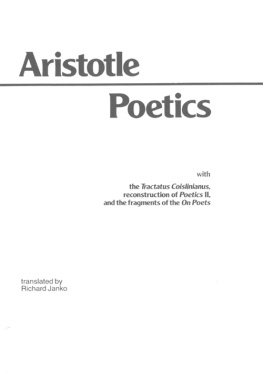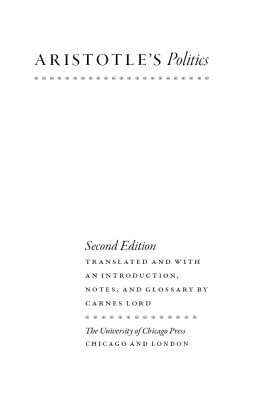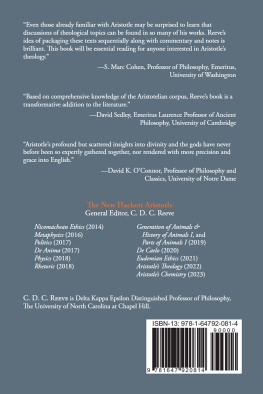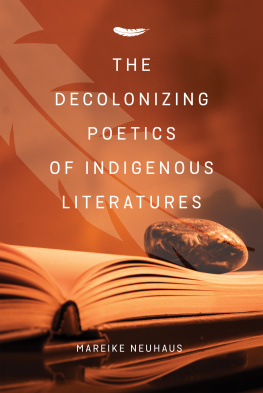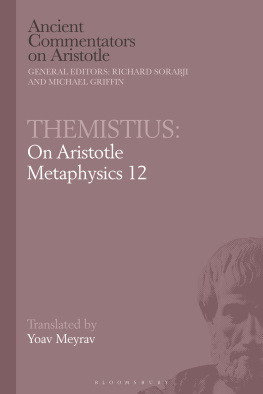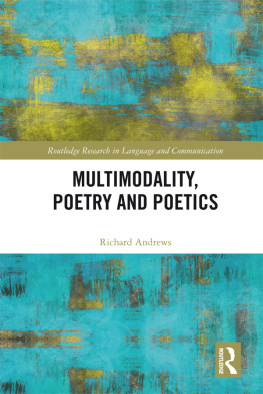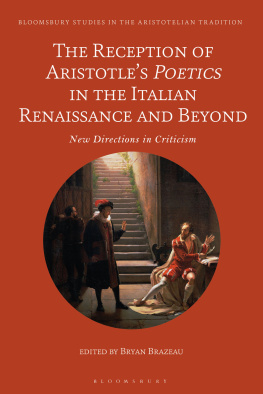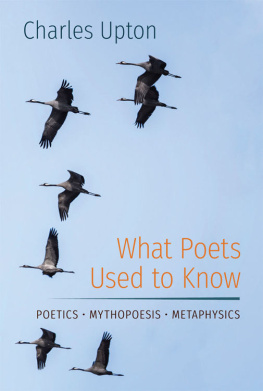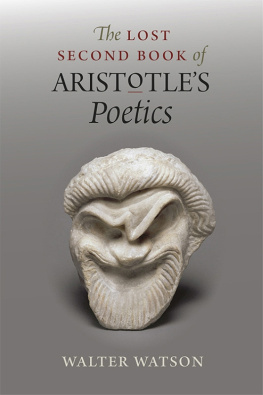Aristotle
Poetics I
with
The Tractatus Coislinianus
A Hypothetical Reconstruction of
Poetics II
The Fragments of the On Poets
translated with notes by
Richard Janko
Hackett Publishing Company
Indianapolis / Cambridge
Aristotle: 384-322 B.C.
All rights reserved
Designed by Dan Kirklin
Cover design by Listenberger Design Associates
Printed in the United States of America
10 09 08 07 06 05 04 6 7 8 9 10
For further information, please address
Hackett Publishing Company, Inc.
P.O. Box 44937
Indianapolis, Indiana 46244-0937
Library of Congress Cataloging in Publication Data
Aristotle.
Poetics.
(Hackett classics)
Bibliography: p.
Includes index.
Contains, in addition to the translation of the extant portion of Aristotles Poetics (here called Poetics I), a translation of the anonymous Tractatus Coislinianus, which Janko sees as an outline of the lost Poetics II, together with Jankos hypothetical reconstruction of Poetics II, and the extant fragments of Aristotles Peri poitn, also in translation.
1. PoetryEarly works to 1800. 2. AestheticsEarly works to 1800. 3. Comedy. I. Janko, Richard, 1955. II. Janko, Richard, 1955. Hypothetical reconstruction of Poetics II. 1987.
III. Aristotle. Peri poitn. English. 1987.
IV. Tractatus Coislinianus. English. 1987.
V. Title.
PN1040.A513 1987 808.2 87-14845
ISBN 0-87220-034-5
ISBN 0-87220-033-7 (pbk.)
The paper used in this publication meets the minimum requirements of American National Standard for Information SciencesPermanence of Paper for Printed Library Materials, ANSI Z39.48-1984.

ePub ISBN: 978-1-60384-955-5
Aristotle was the first accurate critic and truest judgenay, the greatest philosopher the world ever had. So wrote Ben Jonson, whose assessment is still defensible today. Although no excuse is needed for studying the Poetics, it may be as well to justify the appearance of yet another translation of it. This one differs considerably, for better or worse, from its predecessors. I intend it primarily for students of literature, philosophy and literary theory, at both the undergraduate and postgraduate level, who know no Greek; it is meant to supply them with a readable yet accurate translation, accompanied by notes and a glossary to which they can refer as required (hence these sections contain more repetition than I would otherwise have allowed). But I also have in mind the needs of their hard-pressed instructors, who presently lack an adequate commentary on the Poetics which assumes no knowledge of Greek; and it is above all for them that I include the fragmentary material deriving from the lost Poetics II and On Poets, since this is not readily available and goes far to fill the two major gaps in our knowledge of Aristotles theory, his views of comedy and of catharsis. Much of this material is new and exciting, but it is also very difficult, despite my best efforts to render it as accessible as possible; so not every class should be asked to spend time on these sections.
This book will also be of interest to specialists in Greek literature and Aristotelian philosophy. Although its format precluded me from discussing previous scholarship or doing much more than indicating alternative interpretations, my debt to earlier scholars will be apparent at every turn: I should mention especially the work of Vahlen, Butcher, Bywater, Rostagni, Else, Lucas and lastly Dupont-Roc and Lallot. The translation entailed considerable work on the Greek text, since I came to the conclusion that current editions still give insufficient weight to MS B and the Arabic; for knowledge of the latter I am dependent on the annotated Latin version of Tkatsch. The result is that both the text and the interpretation are new in places. As for the fragmentary material, I have altered my controversial views on the Tractatus Coislinianus hardly at all, although the curious will discover some minor revisions; subsequent research on the On Poets has strengthened my belief that these views are on the right lines. I have now connected with that dialogue two neglected Herculaneum papyri which needed substantial reediting, as study in Naples confirmed; the translations of them included here are based on transcriptions I made during that visit, from which I will produce a new edition of them as soon as possible. Meanwhile the expert will find these texts in F. Sbordone, Ricerche sui papiri Ercolanesi I (Naples, 1969), 287372, and M.L. Nardelli, Cronache Ercolanesi 8 (1978) 96103. [I have now republished the former text in Cronache Ercolanesi 21 (1991) 564; see also A. O. Rorty, Essays in Aristotles Poetics, Princeton 1992, 34158.]
On the basis of this and other material, I have come to understand Aristotelian catharsis in a way that will seem new even to some specialists. In fact it is less new than may appear, because in recent years several scholars have been moving towards an interpretation more like that of Lessing than that of Bernays. That they have reached it by different routes, and without knowing the texts from Herculaneum, encourages my sense that we are finally on the right track. Among these scholars I should mention H. House, L. Golden, M. Nussbaum, J.M. Redfield and especially C. Lord. A very similar view of catharsis is now propounded by S. Halliwell, whose volume reached me only after this book was written. I find his attitude particularly encouraging, since he eschews the fragmentary material on which my views are partly based.
This book has gained much from discussion and correspondence with friends and colleagues in two continents and two islands. Above all, I thank Myles Burnyeat of Cambridge, who suggested that I write it for this series, Jonathan Barnes of Oxford, and J.M. Bremer of Amsterdam; without their reaction to my earlier work, I might well have reverted to other projects. The publishers reader was Cynthia Freeland; to her sure judgement and critical acuity I owe many valuable suggestions, most of which were adopted without hesitation. The same must be said of my colleague Dirk Obbink, who read the entire manuscript, produced many pages of incisive comments, and never ceased to seem surprised at my acceptance of his corrections; his combined expertise in Aristotelian philosophy and the Herculaneum papyri proved particularly helpful. My wife Michele read the whole book in draft; her unfailing sense of style, eye for difficulties, and profound understanding of literary theory in all its ramifications made her contribution invaluable. She and Dirk were patient participants in seemingly interminable discussions of catharsis.
I wish to thank my colleagues in the Classics Department for providing so friendly an atmosphere in which to work; Columbia College, for a Lawrence Chamberlain Fellowship (awarded to those who have survived teaching the Core Curriculum), which gave me the time essential for completing this book; and IBM for its gift to Columbia University, Project Aurora, which supplied the microcomputer that speeded its editing. I am grateful to Mr. Colin Haycraft of G. Duckworth and Co. Ltd, and to the University of California Press, for permission to present material adapted from the more scholarly context of Aristotle on Comedy. I thank the National Endowment for the Humanities for a grant to travel to Naples, and my wife for graciously accompanying me thither. I also thank Umberto Eco for his indulgence to an unexpected companion on a certain journey back in time; coincidence can be stranger than fiction, but it is rarely as amusing. The staff of the Classics Faculty Library at Cambridge University assisted me greatly with their kindness, as did Ms. Jackie Maksymowicz with her expert typing of the first draft. Last but not least, the staff of the Hackett Publishing Company have shown me great forbearance during various delays. I much regret that William Hackett did not live to see this book through to publication himself.

